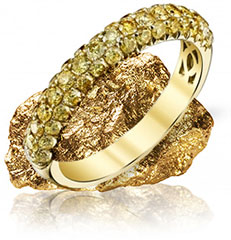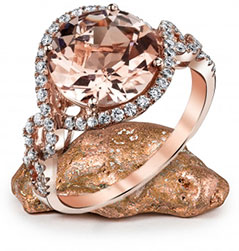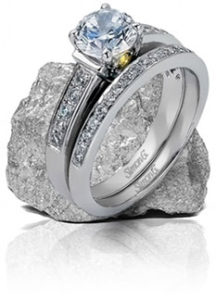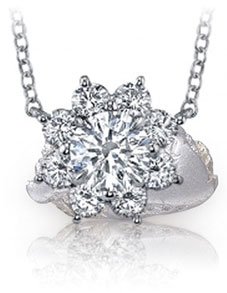Metals
At Sarah Leonard Fine Jewelers we are proud to offer our collections in a wonderful array of metals. Let us help you determine which metal is best for you…

GOLD
Throughout history, gold has been treasured for its natural beauty and radiance. For this reason, many cultures have imagined gold to represent the sun.
Yellow gold jewelry is still the most popular color, but today gold is available in a diverse palette. The process of alloying—mixing other metals with pure 24 karat gold—gives malleable gold more durability, but can also be used to change its color.
 ROSE GOLD
ROSE GOLD
The soft pink complexion of rose gold is usually created through the inclusion of copper. The more unusual colors such as blue and purple (yes, there is actually blue and purple gold!) can be obtained from more complex alloy combinations. Black gold for example derives its color from cobalt oxide.

WHITE GOLD
White gold is created through alloying pure gold with white metals such as palladium or silver. In addition, it is usually plated with rhodium to create a harder surface with a brighter shine. Over time, to keep this beautiful pure-white shine, jewelry requires periodic re-plating.
Karats
The weight of gold is measured in troy ounces (1 troy ounce = 31.1034768 grams), however its purity is measured in ‘karats’ (not to be confused with carats, the metric measure of weight used for diamonds and gemstones).
‘Karatage’ is the measurement of purity of gold alloyed with other metals. 24 karat is pure gold with no other metals. Lower karat metals contain less pure gold; 18 karat gold contains 75% gold and 25% alloy, while 14 karat is 58.5% pure gold with a greater alloy content. The purity of the metal affects the color, weight, and value of the finished jewelry.
PLATINUM
 Naturally white, the rarest of precious metals and the most secure setting for diamonds and precious stones. Platinum is the perfect choice for an expression of love that will last a lifetime.
Naturally white, the rarest of precious metals and the most secure setting for diamonds and precious stones. Platinum is the perfect choice for an expression of love that will last a lifetime.
PURE
- Platinum is naturally white so it will not cast any color into a diamond
- Platinum is usually 95% pure in jewelry so will never fade or tarnish
- Platinum is hypoallergenic, ideal for those with sensitive skin
RARE
- Platinum is 30 times more rare than gold
- Platinum jewelry is exclusive, a statement of individuality and desired by those in the know
ETERNAL
- Platinum’s durability and resistance mean your jewelry will last for a lifetime of wear
- Platinum does not wear away so it holds precious stones securely
From Fabergé to Cartier, the world’s greatest jewelry designers have always preferred working with platinum. Its remarkable pliability allows it to be drawn out to a fine wire, enabling the creation of intricate platinum designs which could not be fashioned from other precious metals.










